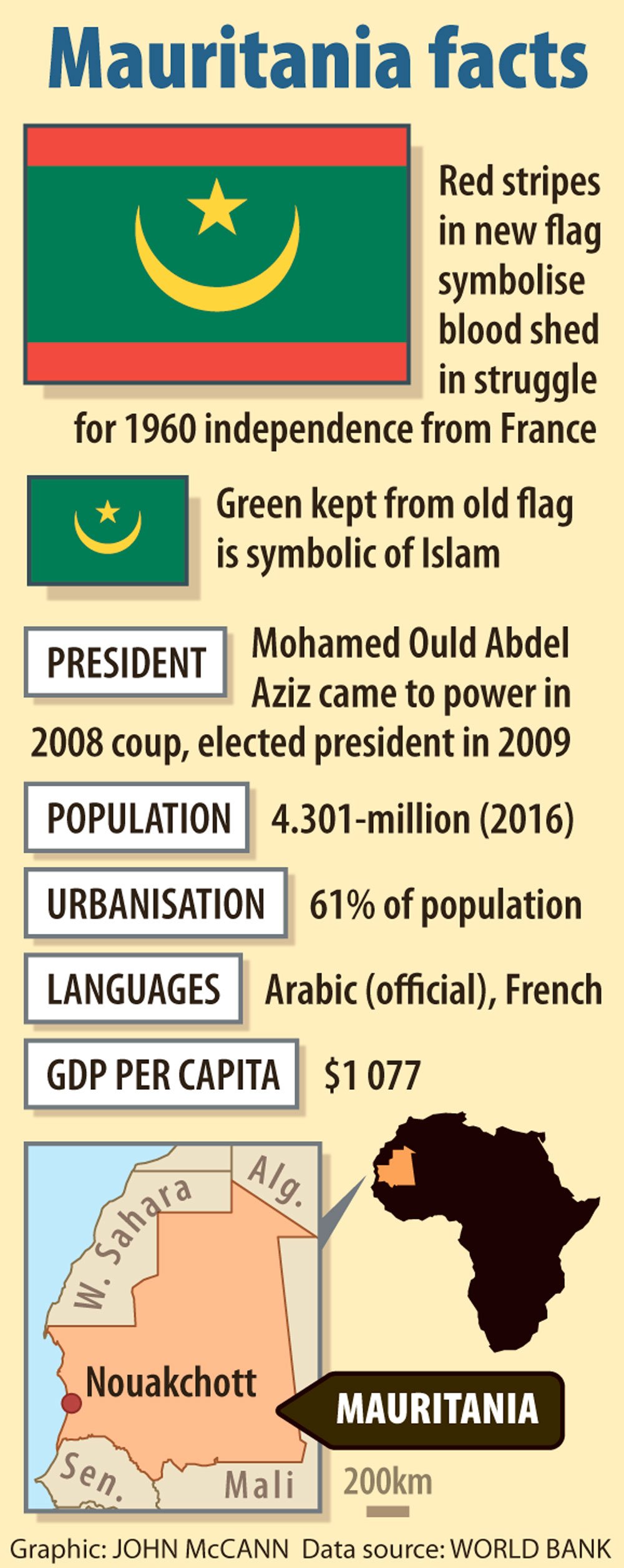President Abdel Aziz has two years of his second term in office remaining
The design of the Mauritanian flag is simple, yet classic: a yellow star-and-crescent set against a rectangle of emerald green.
Too simple, says President Mohamed Ould Abdel Aziz, who wants to add a thin band of red on the top and bottom. The red represents the blood spilled by his people in the fight against French colonialism.
On Sunday, Mauritanians approved the new design in a referendum, with an 85% majority.

That wasn’t the only major change they were approving, however. The ‘oui’ vote also amended Mauritania’s constitution to abolish the Senate, which functions as the upper house of parliament. In the run-up to the vote, President Abdel Aziz described the Senate as “useless and too costly”.
Combining the flag issue with the Senate issue on a single referendum was a typically cunning move from the president: voting to keep the Senate also meant voting against honouring the martyrs from the independence fight.
Or, as the president himself explained: “To vote no is to oppose the development of the country.”
Along with this electoral sleight of hand, opponents to the proposed changes also faced intimidation from security forces. “Protest leaders were reportedly beaten up and a number of them were arrested,” said the United Nations Human Rights Office in the build-up to the referendum.
Nonetheless, there was still plenty of opposition to the president’s move. Eight opposition parties boycotted the vote entirely, while civil society groups warned that this is the first step in an effort to extend the president’s time in office.
President Abdel Aziz has two years of his second term in office remaining, after which he is constitutionally-mandated to step down. Critics fear that this new constitutional amendment — which was initially blocked by the Senate — paves the way for further constitutional changes that will allow Abdel Aziz to stay in the top job.
“We believe that if there are things to change, they should be related to national unity, to ensure cohabitation between members of diverse ethnic groups, to making all national languages official to guarantee fairness,” said Dia Alassane, head of social activist movement Touche Pas à Ma Nationalité (Don’t Touch Me on My Nationality). “It is these things that are important, not the changing of the flag or the national anthem, which is just a prelude to changing the Constitution on the issue of term limits.”
A group of opposition leaders dismissed the referendum as “electoral farce which has given way to open-air fraud”. Members of the Senate are meanwhile staging a sit-in at the Senate buildings in the capital Nouakchott, in protest. Admittedly, having just been made redundant, they don’t have anything better to do.
Not that the president seems worried. As he cast his vote on Sunday, in Nouakchott West district, he dismissed “the phantom opposition” that only exists on social media. “Those who have followed the news lately realize that they have no impact on the national political scene,” he said.
President Abdel Aziz came to power in this large but sparsely-populated country — just 4.3-million people in a space only a little smaller than South Africa — through a military coup in 2008. He was elected the next year, and then again in 2013, although this vote was also boycotted by most opposition parties.
While his record on human rights is poor, the president enjoys significant support from the international community because of Mauritania’s active role in the fight against terrorism in the Sahel region. Recently, Mauritania signed up to the ‘G5 Sahel’, a regional counter-terrorism composed of troops from Mali, Mauritania, Burkina Faso, Niger and Chad.